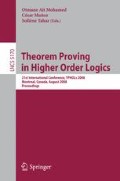Abstract
Type Classes have met a large success in Haskell and Isabelle, as a solution for sharing notations by overloading and for specifying with abstract structures by quantification on contexts. However, both systems are limited by second-class implementations of these constructs, and these limitations are only overcomed by ad-hoc extensions to the respective systems. We propose an embedding of type classes into a dependent type theory that is first-class and supports some of the most popular extensions right away. The implementation is correspondingly cheap, general and integrates well inside the system, as we have experimented in Coq. We show how it can be used to help structured programming and proving by way of examples.
Access this chapter
Tax calculation will be finalised at checkout
Purchases are for personal use only
Preview
Unable to display preview. Download preview PDF.
References
Birtwistle, G.M., Dahl, O.-J., Myhrhaug, B., Nygaard, K.: Simula Begin. Studentlitteratur (Lund, Sweden), Bratt Institut fuer neues Lernen (Goch, FRG), Chartwell-Bratt Ltd (Kent, England) (1979)
Chakravarty, M.M.T., Keller, G., Jones, S.L.P., Marlow, S.: Associated types with class. In: Palsberg, J., Abadi, M. (eds.) POPL, pp. 1–13. ACM Press, New York (2005)
Coquand, T., Pollack, R., Takeyama, M.: A logical framework with dependently typed records. In: Hofmann, M.O. (ed.) TLCA 2003. LNCS, vol. 2701, pp. 105–119. Springer, Heidelberg (2003)
Damas, L., Milner, R.: Principal type schemes for functional programs. In: POPL, Albuquerque, New, Mexico, pp. 207–212 (1982)
Grégoire, B., Leroy, X.: A compiled implementation of strong reduction. In: ICFP 2002, pp. 235–246. ACM Press, New York (2002)
Haftmann, F., Wenzel, M.: Constructive Type Classes in Isabelle. In: Altenkirch, T., McBride, C. (eds.) TYPES 2006. LNCS, vol. 4502, pp. 160–174. Springer, Heidelberg (2007)
Huffman, B., Matthews, J., White, P.: Axiomatic Constructor Classes in Isabelle/HOLCF. In: Hurd, J., Melham, T. (eds.) TPHOLs 2005. LNCS, vol. 3603, pp. 147–162. Springer, Heidelberg (2005)
Jones, M.P.: Type classes with functional dependencies. In: Smolka, G. (ed.) ESOP 2000 and ETAPS 2000. LNCS, vol. 1782, pp. 230–244. Springer, Heidelberg (2000)
Kahl, W., Scheffczyk, J.: Named instances for haskell type classes. In: Hinze, R. (ed.) A Comparative Study of Very Large Data Bases. LNCS, vol. 59. Springer, Heidelberg (2001)
Kammüller, F., Wenzel, M., Paulson, L.C.: Locales - A Sectioning Concept for Isabelle. In: Bertot, Y., Dowek, G., Hirschowitz, A., Paulin, C., Théry, L. (eds.) TPHOLs 1999. LNCS, vol. 1690, pp. 149–166. Springer, Heidelberg (1999)
Letouzey, P.: Programmation fonctionnelle certifie – L’extraction de programmes dans l’assistant Coq. PhD thesis, Universit Paris-Sud (July 2004)
Moors, A., Piessens, F., Odersky, M.: Generics of a higher kind. In: ECOOP 2008 (submitted, 2008)
Pollack, R.: Dependently typed records for representing mathematical structure. In: Aagaard, M.D., Harrison, J. (eds.) TPHOLs 2000. LNCS, vol. 1869, pp. 462–479. Springer, Heidelberg (2000)
Saïbi, A.: Typing algorithm in type theory with inheritance. In: POPL, La Sorbonne, Paris, France, January 15-17, 1997, pp. 292–301. ACM Press, New York (1997)
Sozeau, M.: Subset coercions in Coq. In: Altenkirch, T., McBride, C. (eds.) TYPES 2006. LNCS, vol. 4502, pp. 237–252. Springer, Heidelberg (2007)
The Coq Development Team. The Coq Proof Assistant Reference Manual – Version V8.1 (July 2006), http://coq.inria.fr
Wadler, P., Blott, S.: How to make ad-hoc polymorphism less ad hoc. In: POPL, Austin, Texas, pp. 60–76 (1989)
Wenzel, M.: Type classes and overloading in higher-order logic. In: Gunter, E.L., Felty, A.P. (eds.) TPHOLs 1997. LNCS, vol. 1275, pp. 307–322. Springer, Heidelberg (1997)
Wenzel, M., Paulson, L.: Isabelle/isar. In: Wiedijk, F. (ed.) The Seventeen Provers of the World. LNCS (LNAI), vol. 3600, pp. 41–49. Springer, Heidelberg (2006)
Author information
Authors and Affiliations
Editor information
Editors and Affiliations
Rights and permissions
Copyright information
© 2008 Springer-Verlag Berlin Heidelberg
About this paper
Cite this paper
Sozeau, M., Oury, N. (2008). First-Class Type Classes. In: Mohamed, O.A., Muñoz, C., Tahar, S. (eds) Theorem Proving in Higher Order Logics. TPHOLs 2008. Lecture Notes in Computer Science, vol 5170. Springer, Berlin, Heidelberg. https://doi.org/10.1007/978-3-540-71067-7_23
Download citation
DOI: https://doi.org/10.1007/978-3-540-71067-7_23
Publisher Name: Springer, Berlin, Heidelberg
Print ISBN: 978-3-540-71065-3
Online ISBN: 978-3-540-71067-7
eBook Packages: Computer ScienceComputer Science (R0)

